

Consolarium blog
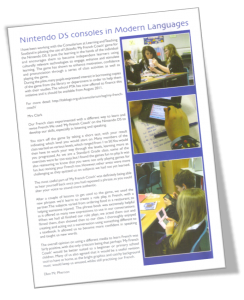 So, it’s the end of the school year and Modern Foreign Language pupils at Firrhill High School in Edinburgh have been reflecting on the use of My French Coach on the Nintendo DS in their French lessons. One of the pupils, wrote about her and her classmates experience of the DS in the school magazine, Firrhill Heights.
So, it’s the end of the school year and Modern Foreign Language pupils at Firrhill High School in Edinburgh have been reflecting on the use of My French Coach on the Nintendo DS in their French lessons. One of the pupils, wrote about her and her classmates experience of the DS in the school magazine, Firrhill Heights.
You can read her article here.
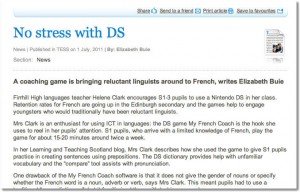 Helene Clark, the languages teacher who lead the project is delighted with the impact the game has had on her pupils learning and spoke to Elizabeth Buie at the TES about her experience. You can read the article here.
Helene Clark, the languages teacher who lead the project is delighted with the impact the game has had on her pupils learning and spoke to Elizabeth Buie at the TES about her experience. You can read the article here.
As a result of the project, Helene submitted a proposal for funding from the PTA at the school in order to buy language based DS games, and other games the Consolarium have used in the past, to be kept in the school library for pupils to borrow in order to improve their French, or indeed get a taster of a new language. Helene stated:
I managed to purchase 14 games for our school library, as well as 2 DS consoles. The idea is that children will be able to borrow the games as they can borrow books to practice French, German, Spanish and Mandarin at their leisure. I have also purchased a couple of “My Word coach” and “Brain Training” games to show that some games can be used to support literacy and numeracy.
The My French Coach games for the DS have been discontinued, however, Ubisoft have made the game (and others) available on the iPod touch / iPad at a cost of £2.99 from the AppStore, thus making it even more accessible to pupils / departments who have these devices.
MoreAs well as dong a lot of work at the Consolarium on Games Based Learning and Games Design we also research and investigate other technologies that we think will have a real impact in the classroom. In the last 12 months this has included 3D printing, mobile Apps, social software, multi-point and tablet technology.
One of the technologies that we see real potential in at the moment is GPS and Geocaching. We will be publishing a whole heap of resources and ideas to help support schools with this sometime before the summer.
As part of the recent Games to Learn Conference we ran a Geocaching workshop to help introduce practitioners into what GPS and Geocaching is and how it might have real education value. The weather was spectacular for the workshop and 30 educators had a great time treasure hunting around Dundee.
Have a look at the picture below:
Can you see the joy and excitement on their faces? This is impact of finding your first Geocache – pure excitement! The video below explains what Geocaching is:
During the workshop at Game to Learn participants had an opportunity to find some cashes from geocaching.com. These were mainly magnetic cashes and hidden around the city. We also hid some of our very own Consolarium Cashes and cryptic questions for people use their GPS to find and answer.
Using a GPS with pre-loaded co-ordinates our Consolarium adventures had to complete the following tasks:
1) Uncover a micro magnetic cache in the middle of the city (who would have know it was there!) -
2) Collect a sticker from inside a false rock in the graveyard -
3) Explore the history of Dundee by taking a crayon rubbing of the historic plaque (also works well with trees, statues and grave stones!) -
4) Find out about Roman Numerals and the height of the water at the HMS Discovery -
5) Take a digital picture of an engraving on the roof of a landmark that you would never normally see unless you stood in exactly the right place and looked up - 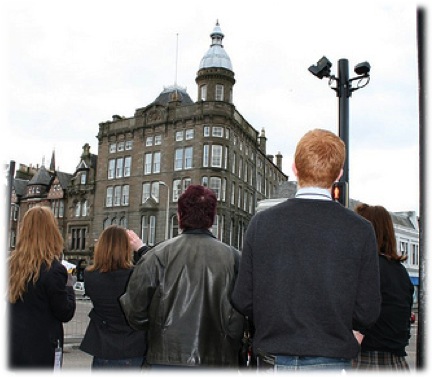
6) Record and answer in audio using their mobile phone or talking tin -
As well as the above the groups has to work as a team, persevere and look after each other while they were alone in the city! They all did very well!
@OnTheSuperFly recorded the journey of his group really well as a series of Flickr Images and an associated blog post. Most of the above photos are his as well.
When he got home Andrew McLaughlin re-created the excitement as a Go-Animate Animation! GoAnimate4Schools.com: Geocaching #gametolearn by Andrew McLaughlin
In summary, at the Consolarium we think geocaching and educaching had huge potential in schools to help support learning and we will be writing more about this very soon!
MoreWow! What a response we have had to our Game To Learn afternoon practical workshops! More than half are fully booked and only a few spaces left in the others! As you can see from the table below, we’ve had great interest in our Game Design work shops that focus on Scratch, Build Your Own Blocks, Kodu, RPG Maker VX and 2Simple’s Purple Mash /2DIY as well as Thinkworlds 3D environment building session.
This demonstrates just how keen educators are in Scotland to equip themselves with skills to deliver the Game Design CfE outcomes in their classrooms. What is even more great to see is that it’s not just Computing teachers taking advantage of the sessions, but practioners from all over the curriculum - secondary and primary.
The three sessions that still have spaces in them promise to be an engaging experience for everyone involved.
NB - We will keep you updated via this blog and twitter (follow @gametolearn and the hashtag #gametolearn) should we receive any cancelations or find some more space in any of the full workshops.
|
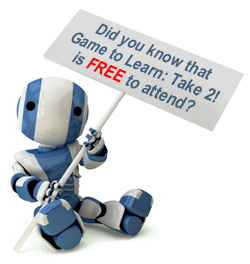 The Consolarium in partnership with JISC are delighted to be bringing the Game To Learn conference to the University of Abertay Dundee on Saturday 19th March.
The Consolarium in partnership with JISC are delighted to be bringing the Game To Learn conference to the University of Abertay Dundee on Saturday 19th March.
The Saturday Programme offers both a fun-packed CPD event for teachers as well as a celebration of the diverse and innovative practice in games-based learning and game design that has been happening in schools across Scotland. Over the past few years the LTS Consolarium initiative has been working with partner schools across Scotland to help nurture the idea that commercially available computer games, that have been developed for entertainment, can be used to help create appealing, purposeful and challenging contexts for learning.
Game Design also offers learners of all ages to engage with the creative process in an engaging and contemprary way that really can facilitate effective CfE delivery. Throughout the morning seminars and afternoon workshops, delegates will have the opportunity to hear from practioners and their use of game design and get some hands on time with game design tools.
Half of the sessions are already fully booked so book your place now to avoid disappointment.
Sessions that are still available include, but not limited to ….
Read about our work with Nintendogs and the Nintendogs case study
Read about our work with the Kinectimals and our Professor Layton case study.
Read about our work with the Eyepet and Gerry’s experiences with Game Based Learning, and others’ experiences in the futurelab report
This may be especially of interest to languages teachers, active school coordinators, PE teachers, class teachers and deputes from Primary and Secondary schools who are interested in seeing how ‘subject specific’ game based learning projects can impact on the whole school.
Read about our work with Just Dance and My French Coach.
Phew! What a start to the day! Follow up your morning seminar with a spot of free lunch, the chance to talk to industry exhibitors then on to a practical, fun filled hands on session. Workshops still available include, but again not limited too..
Using RPG Maker VX to Help Tell Stories & Make Connections Across Learning
Mathew Reid, English Teacher, Garnock Academy, North Ayrshire
“If you’re asking, I’m dancing!” – Join Us for the Just Dance-athon!
Fiona Ferrie, PE Teacher, Doon Academy
Derek Robertson, National Adviser, Consolarium, Learning and Teaching Scotland
Purple Mash: Glow Resources and Game Design with 2DIY
Alan Yeoman, 2Simple Software
Playful, Outdoor and Blended Learning Using GPS
Ollie Bray, National Adviser for Emerging Technologies in Learning, Learning & Teaching Scotland
What are you waitng for? Get your game on now … for FREE!
Hope to see you all on Saturday 19th March 2011
Read Part 1 here
In S3, pupils have a fairly developed knowledge of French and my class has initially enjoyed playing the game and progressing through levels for the first couple of weeks of its used.
They soon needed to be more challenged and felt that the “compare” tool (repeating phrases) was making them feel self aware in front of others in the class.
Pupils were asked to work in pairs in order to create a conversation in French using the My French Coach software. They were invited to choose a topic of their choice and make reference to their consolidated knowledge of French in order to create sentences which were grammatically and structurally correct. Their task was flexible in terms of length, vocabulary, originality, use of humour and props, etc…
Previously, pupils had only practised very short, set up role plays in class on specific topics.
Pupils first familiarised themselves with the phrase book and dictionary tools. Each pair then discussed and agreed on a topic and started constructing their sentences being able to get confident with unknown vocabulary using the “compare tool” in order to learn and practice the pronunciation of their new words.
The phrase book tool offers a variety of topics (such as holidays, greetings, shopping…), most of which haven’t been taught in class.
Below, we can see a short clip of pupils discussing their role play using the DS.
Once the task was completed, pupils were filmed, performing their role play and were asked to assess each other as follows
Pupil A: “It’d be good if the phrase book focussed more on topics studied in French such as school, but the compare tool helps with pronunciation.”
Pupil B: “I enjoyed using the DS and feel it’d be good if there was a voice recognition device where you can record your Standard Grade speaking pieces and it would then be said by a French person!”
I feel this task has been very well received by my pupils. They felt it was something exciting to do and it really raised their confidence in speaking French as well as thinking about their next steps in order to make progress.
During the preparation of their task, pupils needed teacher’s help but a lot less than for other types of writing work. I also felt that pupils were “on task” and developed their social skills without realising: compromising, working as part of a team, listening to others’ views, use of praise and being considerate: “is it ok to use stereotype? Will I offend someone?”
Below is an example of the role plays produced by the pupils.
Finally, we can see the critera chosen, and the feedback given by the pupils.
Read Part 1 here
MoreWhen first playing my French Coach, the user takes a test which sets their initial comprehension of the French language. The player is then placed into a level reflective of their score. A player who scores highly will be able to skip many of the initial levels and more basic concepts.
When starting a lesson, the player is shown ten new words, which include nouns, verbs, adjectives, or adverbs, as well as their meanings and pronunciation.
The software also includes a dictionary and phrase book, complete with audio pronunciations and the facility to record your own pronunciation for comparison purposes.
Hélène Clark, Modern Languages teacher at Firrhill High School in Edinburgh, has used My French Coach with her S1 - S3 classes between September and December 2010. This is the first of 3 blog posts which will document some of her work with pupils using the software.
In S1, pupils have a limited knowledge of French and my classes have enjoyed playing the game and progressing through levels for 15-20 minutes use about twice a week.
Pupils have been keeping a record of their progress at the back of their jotters, reflecting on their learning and noting new words they have learned. This coupled with the individuals user profile on the software allows the pupils to see how they are progressing with the language in a contemporary, familiar way that many of them are used to seeing with their social network profiles and console game profiles. In order to unlock different areas and types of game, pupils must master words. This has proven to be a highly motivating factor.
While the game itself is a useful and motivating tool, Helene used other parts of the software as learning tool. Below is a summary of one of the tasks.
Pupils were asked to work in groups in order to create sentences using prepositions which they had learnt in class: sur, sous, dans, devant, derrière
Previously, pupils were taught how to create sentences using words they had been taught in class eg: Le chat est sur la table.
Each group was then given a photo/drawing (similar to the one below) that had unfamiliar animals, objects and rooms in them.
In groups, pupils used the My French Coach dictionary to inspire them in completing the task,
Pupils were already familiar with the dictionary tool available in the software. They were asked to examine the pictures given to them and construct descriptive sentences, using DS dictionary to find and learn unfamiliar words, including learning the pronunciation of their new words. (using the “compare” tool)
NOTE - One drawback of using the dictionary on the “My French Coach” software is that it does not give the gender of nouns and doesn’t specify if the French word given is a noun, adverb or verb. Therefore, a broader understanding of the language is necessary and S1 pupils needed to use a “paper dictionary” in order to find the gender: masculine (le) / feminine (la)
When asked about the task, pupils felt assertive about expressing their opinions:
Pupil A: “the software is very useful but it should be changed so that we can see the gender”
Pupil B: “Looking up words on the DS is fast and easier than a paper dictionary”
Pupil C: “Some words aren’t on the DS dictionary”
Pupil D: “The DS tells you how to pronounce words and makes me happier to talk French”
I started using the Nintendo DS consoles in August 2010, at the beginning of the new school year. I didn’t know my S1 students. The first thing I noticed is that using the Nintendo DS has helped me establish a strong, positive relationship with my new classes very quickly. The mention of the project created motivation, excitement and engagement with technology relevant to pupils.
The initial test and progressing through levels lead naturally to peer evaluation, informal discussions, bonding of class members, meaningful reward in the context of the game and meeting each student’s needs – for example:
A lower attaining ADHD pupil, who can be quite restless, started at level 1 after his initial test. He felt frustrated, knew very little French but was engaged and motivated to learn with the DS. Progressing through levels was very meaningful to him. As a result, he has made incredible progress. He may spend 20 minutes to produce 3 French sentences but he thinks thoroughly about the structure of the language and always tries to achieve his full potential. He also learns his vocabulary after each lesson as he has understood the importance of building on his own knowledge. In class, he is always positive, calm and hardworking despite his condition.
A very able, slightly over confident pupil started at level 12 after his initial test. He started by showing off to the rest of the class which didn’t make him very popular in class discussions. However, he soon realised that it was very difficult for him to progress through the levels as the game gets more challenging. He also realised that he was often rushing his work and was missing on important information or making various mistakes from grammar, spelling or structure. His attitude has now changed as he is being more conscientious on his DS or class work. He also often offers to support other pupils, using his own ability and mistakes to helping others in the class. His relationship with the rest of the class is also more positive.
I believe using the game as one tool in my classroom, has helped create an engaging climate for learning for all pupils. I have observed my pupils demonstrating the 4 capacities of Curriculum for Excellence: successful learner, confident individual, responsible citizen and effective contributor.
You can contact Hélène at [email protected]
Read Part 2 here
MoreIt’s cold out there. Really cold. And snowy.
With many of Scotland’s schools remaining closed due to bad weather, a large number of teachers, schools and authorities are trying to deliver some engaging snow related learning experiences for learners via Glow.
We have just created a short Snow Globe animation task using Scratch that can be accessed by all Glow users here. It’s also more than suitable for using with your classes in school too!
Learners with access to Glow will be able to follow the video tutorials to create the animation shown below. Click the green flag to see the animation!
UPDATE! Tutorial Videos Now On YouTube
The video playlist is embedded below, or you can access on YouTube directly here
More Unless you have been asleep for the last few weeks you will have heard that the latest development to the Microsoft xBox platform has been released. Its called Microsoft Kinect (code named Project Natal until fairly recently).
Unless you have been asleep for the last few weeks you will have heard that the latest development to the Microsoft xBox platform has been released. Its called Microsoft Kinect (code named Project Natal until fairly recently).
Kinect is a webcam-style add-on peripheral for the Xbox 360 console (in fact it contains three cameras!). It enables users to control and interact with their Xbox 360 without the need to touch a game controller.
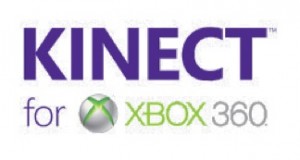 Instead your entire body is scanned and digitized in real time by the camera in the Kinect sensor, and whatever movements you make, your on-screen character can mimic. You can also control your xBox by speaking to it or holding up objects that the sensor recognizes. It is surprisingly accurate and actually quite magical.
Instead your entire body is scanned and digitized in real time by the camera in the Kinect sensor, and whatever movements you make, your on-screen character can mimic. You can also control your xBox by speaking to it or holding up objects that the sensor recognizes. It is surprisingly accurate and actually quite magical.
I was lucky enough to pick up a Kinect on launch day and after a quick go in the shop I was convinced that I just had to have one. We have also now received our delivery for the Consolarium and we hope to have a few of these devices out in schools soon.
I love some of the little features that are built into game play. For example I like it that you can collect accessories for your xBox Live avatar (I have a sweat band and a baseball cap already!) and that the Kinect camera takes pictures of you at different times.
Games for Kinect are a little bit limited at the moment but the ones suitable for education include:
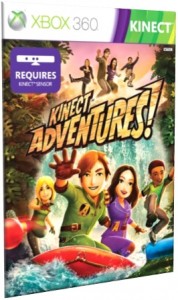 Kinect Adventures (comes with Kinect)
Kinect Adventures (comes with Kinect)
Kinect Adventures uses full body motion to allow you to play a variety of minigames, all of which feature jump-in / jump-out multiplayer play.
Each minigame lasts about three minutes and titles include 20,000 Leaks, River Rush, Rally Ball, Reflex Ridge and Space Pop.
Kinectimals
In Kinectimals you can interact with virtual wild cat cubs after you adopt one in fur town. Once you have adopted your cub you can do a variety of things with it including teaching it tricks, guiding the animal around an obstacle course, feeding and caring for your animal.
I really can’t wait to explore this game more and I’m also interested in how it utilizes Microsoft Tag as an additional game play feature.
Dance Central comes from the creators of Guitar Hero (so it was always going to be a hit with the Consolarium Team) and considering our recent efforts on Just Dance for the Wii we have all be practicing hard!
In Dance Central gameplay involves performing set dance moves which are tracked by Kinect and represented on the screen by one of eight game characters. The game features over 650 different dance moves spanning over 90 dance routines.
I love the fact that it tracks your feet and hands and not just your legs (dance mats) and hands (wii).
Kinect Sports allows multiple players to engage in six different motion-controlled sports. The sports included are Bowling, Boxing, Track and field (Includes Hurdles, Sprint, Javelin, Discus Throw and Long Jump), Table Tennis, Football (Soccer) and Beach Volleyball.
As well as competing against a partner you can also play the game in ‘Sports Party’ mode and this allows you to rally a whole room (or class!) full of players into teams.
I’ve had an opportunity to spend a little bit of time with all of these titles now and they are great fun with loads of potential. I also think that one of the interesting things that the Kinect will do is change the location of the xBox in the home by bringing it from the bedroom into the family room. In the same way that you find Nintendo Wii’s in many people’s living rooms.
One of the reasons for this is space - you do need a lot of space to use Kinect. But the other reason is that lots of the games are really playful and will encourage inter-generation gaming and good honest family fun!
Really can’t wait to get this into a few classrooms.
As a result of presentation about the work of LTS’ Consolarium initiative in Strasbourg last year we were kindly invited to present a keynote talk about the place and value of game based learning in Scottish schools at a teacher technology conference in Bergen.
A few weeks back we received a call from a journalist from the Bergen Times whose interest in what was happening with the Consolarium in Scotland was sparked by his reading of the forthcoming conference’s programme. He told us that he had carried out a bit of research and would really like to see this for himself. A date was duly arranged and his flight to Aberdeen from Bergen allowed us to call on out colleagues in Aberdeenshire to showcase the GBL work that is happening in their schools.
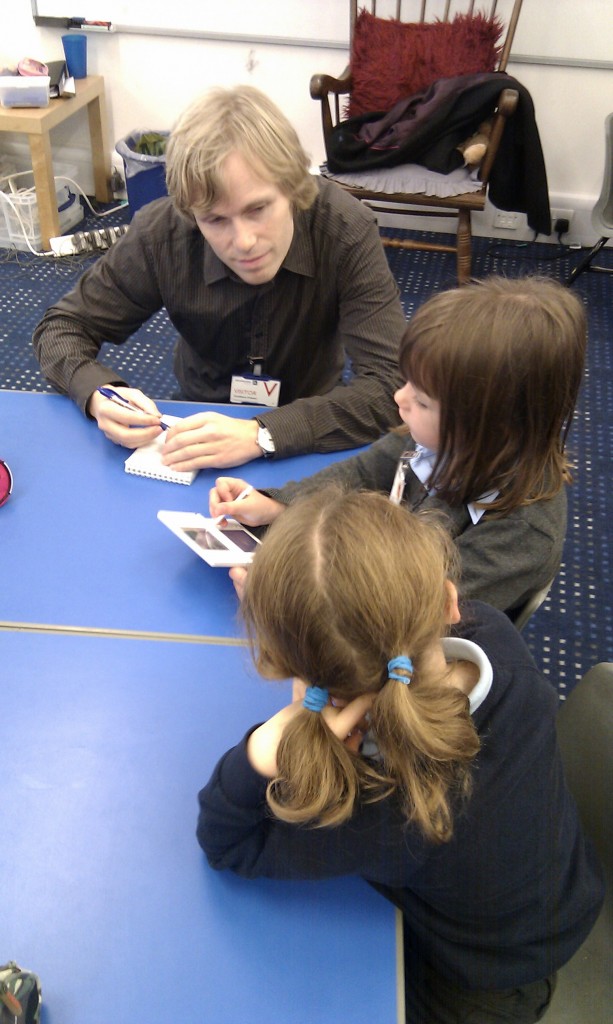 A programme was duly organised and the Norwegian journalist and his photographer spent a day visiting schools who were using a range of computer games in the classroom.
A programme was duly organised and the Norwegian journalist and his photographer spent a day visiting schools who were using a range of computer games in the classroom.
It appears that the game based learning approach that we employ in Scotland is new to Norway and as such it merited a real splash in the Bergen Times Weekend supplement, including a feature on the front cover! It appears that the journalist was somewhat taken aback by the power of what he witnessed in the classrooms he visited and as such he has written a very positive article about GBL in Scotland and what questions Norway can begin to ask itself about how the Consolarium’s ideas, practice and approach might begin to be developed over there.
The article is not online as yet so in the meantime please find attached .pdfs of the article:
Bergen Times Weekend Saturday Supplement main article
Page1: Photograph of kids playing Guitar Hero
There was also a piece following on from the main article that focused on asking schoolchildren from Bergen what they thought about having game based learning in school.
Page 1: Bergen schoolchildren and GBL
Page 2: Bergen schoolchildren and GBL
Finally, there was also a piece in the Sunday edition of the Bergen Times that included comments from prominent Norwegian educationalists about the work of the Consolarium in Scotland.
Bergen Times Sunday edition article
In order for you to make sense of these article we have attempted to use Google Translate so that you can make some sense of the stories featured in the Norwegian press. The translation has worked well although we do think that some meaning has been lost in translation.
There are also some errors in detail in the article that need to be highlighted and corrected:
It appears that the input that we gave at the conference has been well received and has at least started a discussion about the place of game based learning in Norwegian schools. The Bergen Times article has certainly helped!
MoreAt the Consolarium, we are always eager to look for new games to add to our Game Based Learning projects. In mid November 2010, Electronic Arts will release EA Create.
Create Game Info
In Create, use your creativity and imagination to unlock a world of play!
Create tracks your creativity and rewards you for it. The more you create, the more you unlock rewards and exciting challenges to play, opening a world of fun as you go.
Let your imagination run wild, as you create cool environments with easy-to-use tools, including animating objects, textures, and designs that bring your scene to life!
It’s a limitless experience of creative expression paired with exciting and even wacky challenges that have you thinking on your feet to come up with creative solutions.
EA Create seems to have more than a couple of similarities to Little Big Planet for the PS3, but with one big difference - Create will be available for Wii, Xbox, PS3, Mac and PC. With an internet connection, users on any platform will be able to upload their creations and download any other creation and remix it - regardless of what platform they are using, with the exception of the Wii.
This particular game seems to offer a number of opportunities for Game Based Learning projects and indeed may be a great tool to close the gap between game players, game based learners and game creators. A few reasons we are hopeful for this particular game include:
I was thinking that schools could use this game to engage with probelm solving and creativity. Then, set groups of pupils a challange to build a crazy contrapation like a Rube Goldberg machine, just like they can do in create - solve a simple problem by creating a complex solution. Have a look at OK Go’s video for their song ‘This To Shall Pass’ to see such a machine in operation.
A project like this could be a great way to build teamwork, cooperation, environment/recycling, not to mention inter disciplinary links. Look out for an update in the new year once we’ve had a chance to get creating ourselves!
More
Find us on